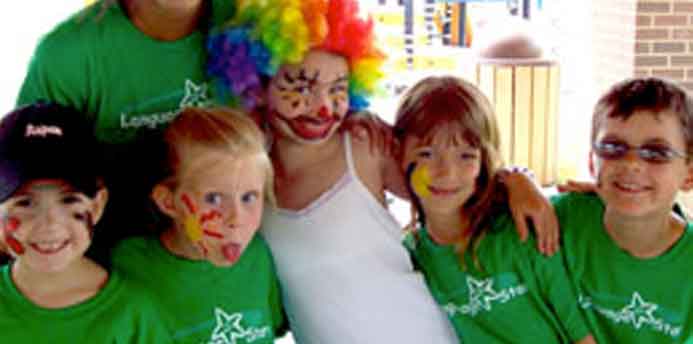Jimmy Wilson of Chicago may only be three years old, but he’s already speaking French, his second language.
He can’t wait to attend his French program each week, greeting his teacher with an enthusiastic, “Bonjour!” From the moment he walks in the door until he says, “Au revoir!” everything he does is in French – skits, puppet shows, crafts and songs are all conducted in the foreign language. At snack time, Jimmy asks for a second helping of goldfish shaped crackers. “Encore des poisons, s’il te plait!” he says as naturally as he would in English.
“Jimmy thinks of French as his own special language,” says Melinda Wilson, Jimmy’s mother. “I can’t imagine not introducing children to a foreign language at a young age. They’re like sponges and want to soak up everything.”
Today, kids like Jimmy are getting the chance to learn a second language before they even enter grade school thanks to Language Stars, a program that engages children in fun and effective language learning with the goal of achieving proficiency in a second language.
It is commonly recognized that young children are uniquely suited to learning a second language, as the developing brain is hard-wired to acquire language. Acquiring a native accent, absorbing and using a new language spontaneously, and expressing opinions instinctively will otherwise never be this natural or easy.
Parents who raise bilingual children are also providing their children with another lifelong gift –increased verbal communication skills and overall intelligence. “While some parents worry that starting their young child on a second language will interfere with developing English skills, the opposite is actually true. Children can differentiate between two languages within the first weeks of life, learning another language actually enhances a child’s overall verbal development,” says Roberta Michnick Golinkoff Ph.D, author of “How Babies Talk”.
The research goes on to show a number of additional cognitive benefits to learning a second language at an early age. Children in the US who learn a foreign language in school show higher cognitive performance in overall basic skills in elementary school. According to the College Entrance Examination Board, they go on to score higher on SATs, exhibit better problem solving skills, enhanced spatial relations, and heightened creativity. Learning a second language early on encourages flexible thinking and communication skills, helping children consider issues from more than one perspective.
It is not surprising that bilingual children go on to enjoy the personal and professional opportunities that accompany:
- An expanded worldview.
- Greater cultural appreciation and sensitivity.
- Ability to learn additional languages more easily, even later in life.
- A competitive edge in future markets and the global marketplace.

